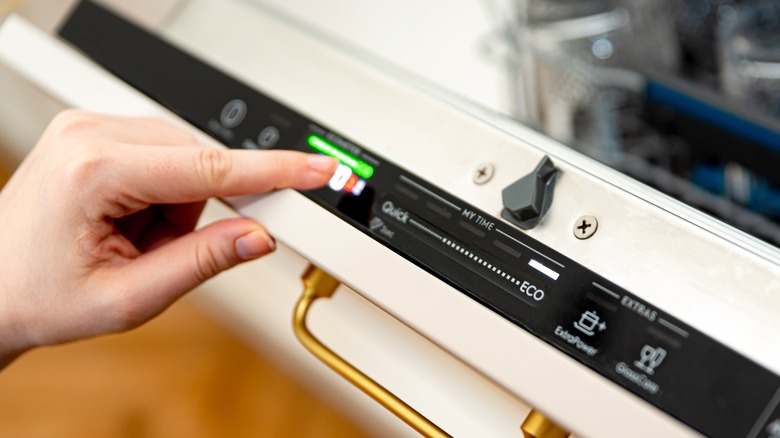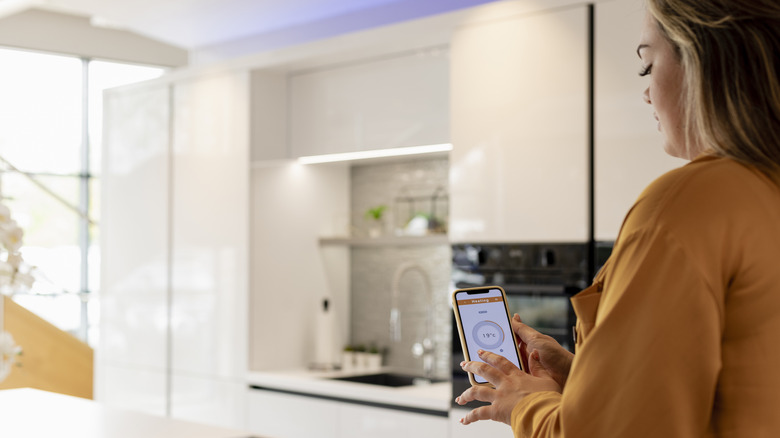HGTV's Drew Scott Has A Helpful Home Improvement Tip For A Lower Energy Bill
Home improvement is a big process that involves numerous considerations. From updating the look and function of your space to making it a truly authentic, very individualized space that represents you, you likely have a lot of goals in your next project. When investing in home improvement you don't want to miss the big picture on improving your space from another vantage point: reducing your energy bill.
Energy bills always seem to be going up. Still, even if you're adding new high-end technology and enhanced lighting, you may be able to make smarter decisions that actually reduce your energy bills overall. You may know to add some insulation to the attic or even have a professional come in to provide a full energy assessment as ways to pinpoint areas of opportunity. Depending on the project you're tackling, you also want to think about what you're buying and how those items, especially appliances, heating and cooling systems, and smart tech, can enhance or detract from your home's energy efficiency.
Property Brothers Jonathan and Drew Scott of HGTV shows "Buying & Selling" and "Forever Home" are noted for their ability to help homeowners upgrade their homes for many reasons, but they are also known for recommending energy-efficient appliances. In fact, Drew Scott says that not upgrading to energy-efficient appliances is one of the design mistakes you want to avoid in any home improvement project.
Start with purchasing energy-efficient appliances
Let's say you're redoing the kitchen. It's time to give it a fresh, new look. As you create your design plan and start looking for appliances, don't overlook the importance of energy efficiency in every appliance purchase. "If you're going to be upgrading anyway, why not get the latest tech and something that will lower your bills?" Drew Scott told Architectural Digest.
Energy-efficient appliances don't perform any less, but they do use less energy to function as expected. As you're shopping for new appliances for your kitchen, for example, make sure you look at the EnergyGuide label that's required on all appliances. The manufacturer provides very specific information on this label about how much it will cost you to power and use this appliance based on that make and model's energy consumption needs. The labels don't say one product or model is better than another. Instead, they give you facts about how much energy the system will use. You can then determine which is best for your needs. Aim to balance function and features that are important to you (like the size of the refrigerator or the BTUs on your countertop grill) with the energy efficiency rating. That way, you're getting what you need but also getting a product that will lower your home's energy bills. This applies to any home improvements you make, from the heating and cooling system to the hot water tank or the faucets in your bathroom.
Consider the value of smart appliances on lowering energy costs
Another way to potentially reduce your energy bill during this home improvement project is to incorporate more smart appliances and features into your home. Not all smart tech reduces your energy consumption, but you will find some excellent ways to upgrade easily.
A good place to start is with your thermostat. If you're upgrading your living room and the thermostat is on the wall, consider replacing it with one that's designed to be an ENERGY STAR-certified smart thermostat. This product provides more control over heating and cooling when the home is unoccupied, helping you to spend less overall. You can do the same with smart lights, using those designed with timers or motion sensors that kick on when there's actually someone in the room rather than all of the time. Both of these upgrades are typically inexpensive and easy to upgrade without having to adjust your home's aesthetics.
The best time to buy smart home technology for your home is when you're upgrading, modernizing, or otherwise improving your space. With so many tech-focused products, it's easy to get carried away. However, making just one or two upgrades can offer energy savings and may make managing your home a bit easier too.


